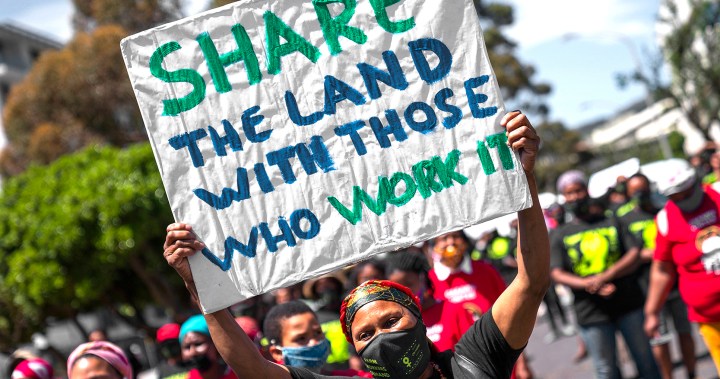TRANSPARENCY INTERNATIONAL
Land corruption hurts those discriminated against most — report

Discrimination and corruption interact in myriad ways, with devasting implications for land rights across seven African countries, including South Africa, a Transparency International report says.
The rising demand for land due to the global food crisis, climate change, rising sea levels, desertification and extreme weather events all limit its availability and accessibility. As global crises exacerbate inequalities, people who experience discrimination see their land rights affected the most.
This is according to a recently published report by Transparency International titled “This Beautiful Land: Corruption, Discrimination and Land Rights in Sub-Saharan Africa”, which explores the dynamics of discriminatory corruption in the land sector.
The report includes evidence and case studies from seven African countries (Ghana, Madagascar, Kenya, Uganda, Zambia, Zimbabwe and South Africa). It draws insights from desk research, key informant interviews and original testimony from affected communities experiencing discrimination — highlighting clear patterns of how corruption and discrimination interact to impact on land rights.
Land corruption includes all corrupt practices in the land sector and threatens the lives and livelihoods of people and communities, the environment and climate, food security and political stability. It is rife, takes many forms, and involves many actors.
“At the institutional level, government officials may seek to adopt or amend legislation or policies or may undermine the effectiveness of established mechanisms to benefit private actors,” read the report.
Discriminatory corruption in the land sector
The report included individuals protesting against unfair compensation following compulsory land acquisition in Uganda, people with albinism in Madagascar who had lost access to land, members of the Nubian community who faced discrimination in Kenya, and farm workers denied fair benefits in equity schemes in South Africa.
The report noted that corruption and discrimination intersect in many ways including:
- Discrimination results in greater exposure to corruption.
- Certain acts of corruption are directly discriminatory. An example of this is collusive corruption between members of politically dominant ethnic groups in Kenya, which shows how corruption can result in the discriminatory denial of access to land.
- Groups exposed to discrimination may be disproportionately impacted by corruption. An example of this is religious minorities in South Africa, who face losing access to places of worship and sites of religious importance as a result of development projects.
- Discrimination and corruption result in the denial of justice. An example of this is that in some countries, anti-corruption and land rights defenders have been subject to violent reprisals on account of their work.
- Corruption impedes the effectiveness of measures designed to advance equality.
The situation in South Africa
The report noted that the nation is defined by the historic injustices of apartheid and that the “land question” in South Africa is deeply rooted in patterns of racial inequality.
“Almost 30 years after the end of apartheid, racial inequalities – particularly in the land sector – remain significant; there is also significant evidence of corruption in the land sector,” read the report.
The scale of land corruption in South Africa is highlighted by a 2019 Corruption Watch report, which is based on 706 submissions between 2012 and 2018 and included evidence of a wide variety of corrupt practices including the bribery of public officials, embezzlement, the misuse of public procurement processes and the distortion of laws and policies by political elites to facilitate the capture of land by business for development purposes.
Read more in Daily Maverick: Corruption Watch research suggests authorities are working with crooks to deprive people of land
Scheme to redress historic harms failing
A chapter by Corruption Watch details how farm worker equity schemes fail to deliver.
Following the formation of the democratic government in 1994, land reform was high on the policy agenda, with the state embarking on a progressive programme of land restitution and redistribution. One of the earliest measures to be introduced was Farm Worker Equity Schemes (FWES).
“These schemes seek to support beneficiaries to become shareholders in a farm, typically in an area of high agricultural value, while equipping them with the skills and support necessary to establish their livelihoods,” read the report.
The precise details can vary between farms based on terms agreed between the landowner, the relevant government department and the proposed beneficiaries, as the schemes are voluntary.
“However, each follows a similar format: the government provides a grant, supporting workers to become beneficial shareholders in a farm, which entitles them to a portion of the ownership of the business and related entitlements, such as voting rights and dividends,” read the report.
Although farm worker equity schemes have been around since the early 1990s, public information on them is limited, but an unpublished government report obtained by Corruption Watch provides some insight.
Since their introduction, hundreds of equity schemes have been rolled out, most located in the Western Cape. Almost R700-million has been paid to privately owned farms, and nearly 24,000 hectares of land had been redistributed by 2013.
Despite these impressive figures, concerns abound regarding implementing the schemes, according to the report.
In 2023, Corruption Watch, the Transparency International chapter in South Africa, interviewed 35 members of eight farm businesses located in the Western Cape. Each participant discussed their experiences of FWES, with many highlighting serious issues with implementing the scheme.
“Perceptions of corruption amongst beneficiaries are high, and despite initial hopes, for a majority, the intended equality benefits are yet to be felt,” read the report.
Several participants reported seeing few or no benefits from the scheme.
“In one case, it was reported that workers received a payment in the mid-2000s and did not receive a second until 2022. In other cases, dividends were paid seldom and irregularly,” read the report.
Even though beneficiaries at several farms voiced their concerns, they have yet to receive an explanation for the low rate of payment.
On rare occasions, some interviewees were occasionally provided financial statements displayed on screens during meetings and presentations.
“When workers raised their concerns, they were often ignored, being told that ‘business was not looking good’ and that they should sell their shares if they were not happy,” read the report.
Many of those interviewed expressed concern regarding a lack of transparency and access to information.
“In one case, participants explained that they were never told the details of their scheme. They simply received papers which they were told to sign so that the farm owner could receive government funding,” read the report.
Many participants said they lacked clear guidance from public officials on how the FWES was intended to operate, that they had been excluded from shareholder meetings and were unable to participate in decisions that affected the running of the business, which has resulted in a strong perception of corruption among interviewees.
Participants say little has changed
Although farm worker equity schemes were designed to help disadvantaged workers, only some participants felt that their situation had changed. Among the concerns voiced were unsafe working conditions, lack of protective clothing, unavailability of trained medical support and labour rights violations.
“One of the biggest concerns raised by participants related to land and housing. While accommodation was regularly provided as part of one scheme, it was only temporary, and workers explained that there was no guarantee they could stay on the land after they finished working. There was also no possibility of family members inheriting the home, and living conditions were said to be poor,” read the report.
In some cases, examples of discrimination on farms were reported, with some indicating that women were paid less despite performing work of equal value.
“Discrimination against persons with disabilities was also highlighted. On some farms, there were no ramps and no bathroom modifications. In one case, we were alerted to abusive behaviour towards a deaf person. The foreman, according to one of the participants, would shout expletives at the worker whenever instructions were misunderstood,” read the report.
While they are entitled to legal protections under the Employment Equity Act, a lack of knowledge of their legal rights means that many feel they have nowhere to turn when abuses take place.
The report notes that the scheme’s novel design, which seeks to redress historic harms by democratising agricultural systems, represents the best of South African ingenuity.
“But governance failures, including a lack of transparency, oversight, resourcing, and effective implementation, mean that the ambition of the scheme has not been fulfilled. Instead, workers feel as though they have been failed,” read the report.
Recommendations
The report urged states to take concrete measures to promote accountability and information transparency in land governance, and policymakers to take immediate action to protect individuals and communities whose land rights were undermined by the dual threats of corruption and discrimination.
Other recommendations include land reform processes should recognise the unique challenges experienced by marginalised communities in exercising their land rights, developing comprehensive anticorruption and anti-discrimination frameworks, and establishing independent and effective accountability mechanisms. DM

















This is a joke right?
Both this government (& friends) and colonialists have robbed the poor to death. Literally. No amount of denial will absolve them or change what history continues to record & tell about them. Denial does though help sleep.